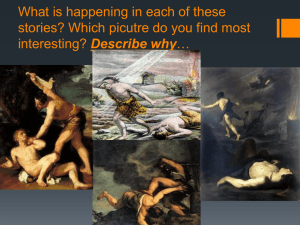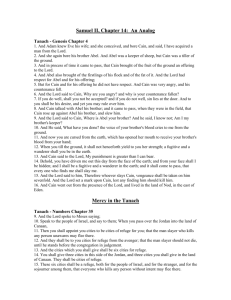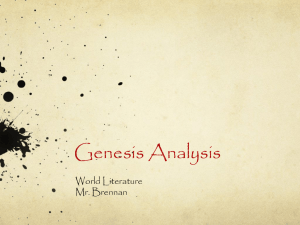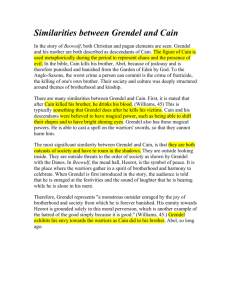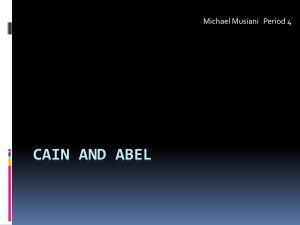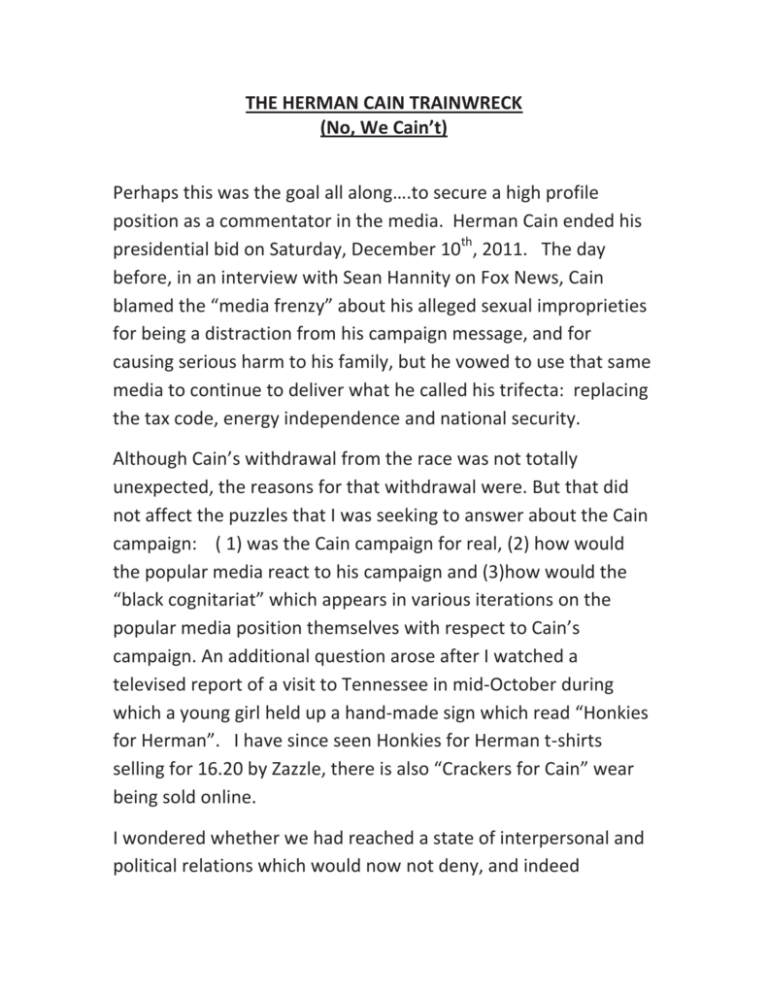
THE HERMAN CAIN TRAINWRECK
(No, We Cain’t)
Perhaps this was the goal all along….to secure a high profile
position as a commentator in the media. Herman Cain ended his
presidential bid on Saturday, December 10th, 2011. The day
before, in an interview with Sean Hannity on Fox News, Cain
blamed the “media frenzy” about his alleged sexual improprieties
for being a distraction from his campaign message, and for
causing serious harm to his family, but he vowed to use that same
media to continue to deliver what he called his trifecta: replacing
the tax code, energy independence and national security.
Although Cain’s withdrawal from the race was not totally
unexpected, the reasons for that withdrawal were. But that did
not affect the puzzles that I was seeking to answer about the Cain
campaign: ( 1) was the Cain campaign for real, (2) how would
the popular media react to his campaign and (3)how would the
“black cognitariat” which appears in various iterations on the
popular media position themselves with respect to Cain’s
campaign. An additional question arose after I watched a
televised report of a visit to Tennessee in mid-October during
which a young girl held up a hand-made sign which read “Honkies
for Herman”. I have since seen Honkies for Herman t-shirts
selling for 16.20 by Zazzle, there is also “Crackers for Cain” wear
being sold online.
I wondered whether we had reached a state of interpersonal and
political relations which would now not deny, and indeed
implicitly condone, the use of a word…Honky…which was such a
pejorative during its use in the Black Power era of the 1960’s by
many black activists when referring to members of the dominant
and (what they considered) repressive white power structure.
Had the American political landscape evolved into the formerly
mythical post-racial society?
METHODOLOGY
In order to reach some conclusions, I began to monitor a variety
of media to test my hypotheses that Cain would be the
beneficiary of a series of “puff pieces” by the popular media,
which would dwell on his Horatio Alger personal success story, his
battle with liver cancer and his 42 year marriage; and that he
would not be seriously challenged in areas of his perceived
weaknesses such as international affairs. I wanted to see whether
editors and journalists across all media platforms would attempt
to keep the Herman Cain story alive at all costs in the interests of
maintaining the horserace aspect which the media count on to
sustain interest in what they might perceive as a new culturally
relevant symbol.
I monitored a range of media outlets, including MSNBC, Daily Kos,
Red State, Politico, Talking Points Memo, N.Y. Times , WOR and
WABC Radio, and the Wall Street Journal. Some of black
congnitariat chatterers I took note of included Niger Innis (son of
Roy Innis, the former chairman of the Congress of Racial Equality),
Michael Eric Dyson, a radio host and Professor at the University of
Pennsylvania. Cornel West at Princeton, Juan Williams,(who lost
his job as a senior news analyst for National Public Radio and
ended up as a political analyst for Fox News. (Wiiliams said he
gets nervous when he gets on a plane and sees passengers in
what he identifies as Muslim clothing. NPR thought he should
keep his opinions private, and terminated his contract), Ron
Christie, a Republican strategist and Roland Martin, among
others.
CAMPAIGN GOALS
So, was the Cain campaign for real. In the final analysis, it was
not. On the Fox News Channel Program “The Five) on October
21st, for example, 4 republicans and 1 democratic panelist
suggested during a 13 minute discussion that the best path for
GOP success was to nominate an authentic candidate and get Cain
out of the race. This was at a point when Cain had ascended to
front runner status with 31 percent in a Nevada straw poll.
Romney has 29 percent and Gingrich had polled 20 percent.
5 days later, on October 26th, Cain was a guest on Fox News host
Sean Hannity’s show, and Hannity lobbed a series of puffball
questions at Cain, such as was he offended when Rick Perry
referred to him as “brother” during the previous debate. Cain, of
course, said he was not offended. But Cain still managed to
mangle some of the bedrock conservative political stances, saying
he was pro-life but abortion was up to the family, that he could at
that point explain the “right to return” (giving any person the right
to return to the country of his or her birth, according to the
Universal Declaration of Human Rights). He claimed that he had
been consulting with his “experts”.
Other indications that the campaign was without substance was
indicated when Cain decided to continue a book tour In North
Carolina in late October rather than campaigning for votes in
Iowa, which is traditionally considered an important marker of a
candidate’s viability. There were few indications of a serious
campaign, including even a low cost item such as bumper stickers.
Fox News Commentator Juan Williams said on October 29th that
he thought Cain actually was viable as a black conservative; that
he’s likeable, and embodies authentic conservative values, but
that he doesn’t have Mitt Romney money, which is inhibiting his
national presence. Meantime, Christian Conservative Ralph Reed
pointed to a poll which indicated 80 percent of respondents asked
whether they would support a Cain nomination said they could
easily change their minds. Reed went on to say that Cain ws
“overperforming”. That was clearly the sentiments of a focus
group in Ohio, which said on October 31st that they liked Cain, but
they didn’t see him as president.
It was at this point in Cain’s campaign that the Republican
establishment began to snipe at him, and deride his 9-9-9
economic plan as poorly thought out. The Washington Post on
October 13th said it found Cain’s three-step process to be “highly
dubious”, since it takes years, or even decades, to fundamentally
overhaul the tax code. The plan calls for a 9 percent income tax, a
9 percent business transactions tax and a 9 percent federal sales
tax.
SEXUAL HARASSMENT
The Cain train began to slow down in early November when
Politico reported that two female employees had complained
about inappropriate behavior by Cain during his tenure at the
National Restaurant Association (1996-mid 1999). The women
reportedly accepted financial settlements from the association
which barred them from discussing their allegations further.
Cain's campaign initially refused comment, but subsequently
acknowledged that the accusations had been made. Cain strongly
denied any impropriety, stating: "I have never sexually harassed
anyone and those accusations are totally false." Sharon Bialek
alleged that Cain had touched her inappropriately in 1997. She
was the first of 3 women to go public with allegations against
Cain, all of which he flatly denied. On a program on WOR radio of
December 11th, host Michael Savage lambasted Sharon Bialek,
calling her a dybbuk whose offer of sex had been refused by Cain
and thus she felt spurned. He said she was a Chicago native who
was “put up to it” by Obama operatives; another example of a
right wing rant with a purely emotional outburst of fiction
unsupported by anything resembling facts.
Erick Ericksen wrote in his Diary on Red State that “We have
never seen a candidate publicly vetted before like this. The closest
comes with the rise of Mike Huckabee in 2008, when we
witnessed what seemed like a never ending media attack. It was,
in reality, the other campaigns running as quickly as possible to
the media to pour out all the dirt they’d rapidly accumulated.”
The defense mantra for the Cain campaign was “blame the
(liberal) media”. All of this notwithstanding the fact that, as
pointed out by Steve Kornacki, a news editor at Salon.com, the
majority of progressives would prefer a Cain presidential
candidacy, and lick their chops at the thought of him debating
Obama.
Turning to the conservative chattering class, It was a strange twist
for right wing darling Ann Coulter when she entered the fray. She
adamantly claimed that she was not buying the sexual harassment
allegations lodged against Cain. In reacting to the charges lodged
October 30th when the sexual harassment charges broke on
Geraldo at Large, she averred, with a straight face no less that
“our (conservative) blacks are better than their (liberal) blacks”.
She went on to define it as a Clarence Thomas-type attack made
up of outrageous charges. It was one of the most outrageous
demonstrations of patronizing ever witnessed so far in 21st
century political theater.
THE RACE CARD
Just as candidate Cain had to deal with the long-term
ramifications of the sexual harassment controversy, the right wing
press will emerge from the saga in a much weaker and (eve) less
trustworthy state, opined Mediamatters for America. Because
rather than waiting for all the facts to emerge (and no meaningful
holes were poked in the Politico story) short-sighted partisans
immediately began their knee jerk, blame-game ritual…referring
to “victim” Cain. On his Clear Channel radio show, Limbaugh
immediately denounced the story as an "unconscionable racially
charged attack. Blogging at instapundit, Glenn Reynolds
dismissed the Politico article as a “hit” job, and predicted it would
not hurt Cain’s standing; in fact, he hinted that a cabal of liberal
journalists was secretly behind the plot to take Cain down. In fact,
on Cain’s webpage there is a link to what he calls his Newsroom,
and one of the posts is titled “once you go conservative black, you
better watch your back”. This is a takeoff from a widely known
trope in the black community which posits “once you go black,
you never go back”. This is a sexual innuendo which embodies
the widely held notion that black men have an inordinate
measure of sexual prowess, and white women should be aware of
what they’re getting themselves into should they decide to
engage in that type of adventure. The point I am making here is
that in his public pronouncements Cain downplayed any notion of
racial politics or outright racism in the campaign. He clearly
signaled his intention to remain “non-racial” when he denied
being offended when Rick Perry referred to him as “brother” on a
debate held on October 25th. But by December 1st, when the
“watch your back” comment was posted, Cain clearly had decided
it was time to play the race card…an indication of the desperate
straits in which he found himself.
The race issue was not only assigned to the non-white campaign
elements. On Fox news on November 11th, Bill O’Reilly had as his
guest Dr. Mark Lamont Hill, a black political commentator and
professor at Columbia University. He asked Hill why no black
activists such as Al Sharpton or Jesse Jackson had come to Cain’s
defense with respect to the sexual harassment charges against
him. O’Reilly said this amounted to hypocrisy, since they did not
defend Cain. Hills answer, quite correctly, was that no crime had
been committed in the Cain instance, and his civil rights had not
been violated. Hill reminded O’Reilly that when Sharpton jumped
into the Tawana Brawley allegations of rape in 1987, he did so
without the facts and later suffered the embarrassment of having
to acknowledge that the Tawana Brawley affair was a hoax. A
similar situation obtained in the O.J. Simpson case, where Jesse
Jackson came to his defense in a knee jerk reaction, simply
because O.J. is black (and Jackson no doubt hoped to get some
political mileage out getting involved in such a high profile case),
but when the facts eventually came to light it turns out Jackson’s
support was misguided. Even though Simpson beat the case,
truth, in the end, will rise, as Simpson is currently incarcerated on
unrelated charges. The point is that O’Reilly’s question itself was
racist. Does a white activist jump in when a white politician is
under fire for an alleged impropriety? Perhaps that should have
been Dr. Hill’s rejoinder.
CAMPAIGN GAFFES
Cain’s campaign gaffes are the stuff of legend. When asked in July
by Fox News commentator John Stossel if there were any cases
where abortion should be legal, he said he didn’t think the
government should make that decision, but then added moments
later that people should not just be free to abort. This is one of
several confusing answers from Cain which have roiled the right
wing Tea Party element of the GOP. His complete blank-out on
whether he supported President Obama’s stance on the
revolution in Libya was another indication of his apparent lack of
cognitive complexity, when he did not know or could not recall
President Obama’s statement of August 22nd in which he said the
Qadhafi regime is showing signs of collapsing and that the people
of Libya are showing that the universal pursuit of dignity and
freedom is far stronger than the iron fist of a dictator. That
statement is unequivocal support for the Libyan revolution. David
Drucker of the national political blog Roll Call said Cain’s brain
freeze during that appearance before the editorial board of the
Milawaukee Sentinel, which was videotaped, could be a Cain
crusher. Cain told CNN’s Piers Morgan he would allow a trade of
Guantanamo prisoners for a hostage negotiation. Then he later
said he would under no conditions deal with terrorists. Which is
it? He also said he will “sign” a constitutional amendment to ban
abortion (Countdown with Keith Olbermann, October 24, Current
TV), not realizing that constitutional amendments do not require a
president’s signature. It’s a clear indication that Cain is not
sufficiently familiar with the Constitution, a document which Tea
Party-ers hold dear.
Rachel Maddow on MSNBC pointed out on December 6th that
Cain’s closing remarks during the first GOP debate in Ames, Iowa
in August was taken from Pokemon. Cain’s exact quote was “a
poet once said ‘life can be a challenge, life can seem impossible;
it’s never easy when so much is on the line”. That is a verse taken
from the theme song of the Pokemon movie. Another instance of
ersatz plagiarism was taken from an episode of The Simpson”s,
when Cain said “America needs a leader, not a reader”, as pointed
out by Talking Points Memo’s Benjy Sarlin. He said the quote
bears a striking resemblance to a joke from The Simpsons Movie
of 2007. In a scene in the White House, Arnold Schwarzenegger
(the President of the United States in the film) is presented with a
series of options on a major decision and immediately picks one
of them without reading it. Explaining how he came to the
decision so quickly, Schwartznegger’s character says “I was
elected to lead, not to read."
Another item on Talking Points Memo highlighted Cain’s claim
that he will overturn the U.S Supreme Court if the court strikes
down the Defense of Marriage Act. He said that during the Iowa
GOP debate. Most 11th graders know that the rulings from the
U.S. Supreme Court cannot be overturned by a president.
On December 19th, the Daily Caller ran an Cain suggestion that the
Taliban and Al Queda are active in Libya. Critics called it another
mis-step by Cain, since there is no indication the Taliban are active
in Libya, according to Timelife.com/worldatwar.
Even GOP strategist Ron Christie (who is black) was
dumbfounded; he called Cain pathetic and not ready for prime
time.
POST RACIAL SOCIETY
Returning to one of my original hypotheses, I examine the notion
of what, in fact, is meant by post-racial, and what is the Honkies
for Herman hermeneutic.
Shelby Steele, an African-American who specializes in race
relations at the Hoover Institution at Stanford University, in an
editorial in the Los Angeles Times of November 5, 2008, would
have us believe that the Obama presidency was accomplished
because he tapped into a deeply embedded longing by white
people to escape and disprove the racism about which they felt
stigmatized; that America had essentially contained the evil of
racism to the point at which it was no longer a serious barrier to
black advancement. Paul Warmington at the University of
Birmingham School of Education in the U.K. argues (2009) that we
are post racial in having moved beyond pseudo-genetic notions of
race, but although we refute the biological conceptions of race we
are not post-racial per se. Lydia Lum writes in Issues of Higher
Education (2009) that while the term post-race has emerged in
the national discourse within the past few years, many scholars
say the same subtext already lived in catch phrases like “color
blind” more than a decade ago. Thus we may just be engaging in
faddism by our use of the post-racial ideal. I tend to agree with
the notion that we are not post-racial in the sense that everyone
can relax now because racism is no longer officially on the
national radar. But there does seem to be an attenuation of the
very worst practices of overt racism. That would account for the
Honkies for Herman and Crackers for Cain campaign posters and
sentiment, which seemed to be a regional attempt at a personal
apology to a fellow southerner (Cain was born in Tennessee and
raised in Georgia) by those who would now be his cohorts. They
are saying, in effect, that all is forgiven. In this narrow sense,
there may be indeed a snipped of Shelby Steele’s putative white
guilt since these posters seemed largely to appear in states of the
confederacy. So, to answer my question about whether the
American political landscape had evolved to embrace the formerly
mythical post-racial society, the answer is the post-racial ideal
remains mythical, by and large, but with episodic indications that
give rise to hope for an eventual transition toward a more visible
and visceral reality.
That brings me to the black cognitariat, whom I suspected would
want to show how as a group they can assert their independence,
and escape the ignominy of journalistic groupthink by a black
monolith.



